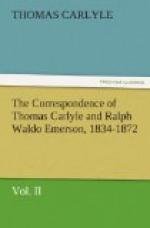Alas, I have yet written nothing; am yet a long way off writing, I fear! Not for want of matter, perhaps, but for redundance of it; I feel as if I had the whole world to write yet, with the day fast bending downwards on me, and did not know where to begin,—in what manner to address the deep-sunk populations of the Theban Land. Any way my Life is very grim, on these terms, and is like to be; God only knows what farther quantity of braying in the mortar this foolish clay of mine may yet need!— They are printing a third Edition of Cromwell; that bothered me for some weeks, but now I am over with that, and the Printer wholly has it: a sorrowful, not now or ever a joyful thing to me, that. The stupor of my fellow blockheads, for Centuries back, presses too heavy upon that,—as upon many things, O Heavens! People are about setting up some Statue of Cromwell, at St. Ives, or elsewhere: the King-Hudson Statue is never yet set up; and the King himself (as you may have heard) has been discovered swindling. I advise all men not to erect a statue for Cromwell just now. Macaulay’s History is also out, running through the fourth edition: did I tell you last time that I had read it,—with wonder and amazement? Finally, it seems likely Lord John Russell will shortly walk out (forever, it is hoped), and Sir R. Peel come in; to make what effort is in him towards delivering us from the pedant method of treating Ireland. The beginning, as I think, of salvation (if he can prosper a little) to England, and to all Europe as well. For they will all have to learn that man does need government, and that an able-bodied starving beggar is and remains (whatever Exeter Hall may say to it) a Slave destitute of a Master; of which facts England,




